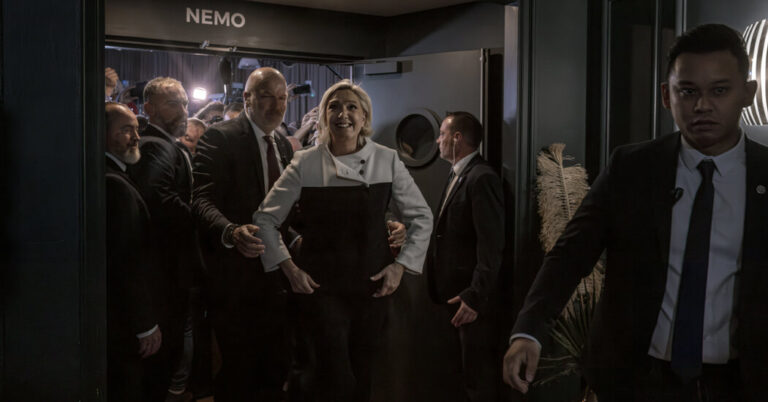French pollsters have predicted based on preliminary results that France could be heading for a long period of political deadlock after no party or coalition won an absolute majority in parliament.
Experts said the path forward was unclear but that the country could be in a state of political instability for months with President Emmanuel Macron facing deep parliamentary divisions, including two factions strongly opposed to him.
“Without an absolute majority, the government will be at the mercy of the opposition’s unity,” said Dominique Rousseau, professor emeritus at the Panthéon-Sorbonne University in Paris.
Forecasts suggest that France’s lower house, the National Assembly, will be roughly divided into three main blocs with competing agendas and, in some cases, deep hostility towards one another.
Pollsters projected on Sunday night, when the final round of voting in the parliamentary elections closed, that a group of left-wing parties called the New Popular Front would win the most seats, followed by Macron’s centrist coalition and the anti-immigration nationalist Rally National. It was unclear whether a centrist or right-wing party would come in second.
As things stand, none of the three major parties seem able to work with the others. They might try to cobble together a majority with the few smaller parties and independents who make up the rest of the House of Representatives, but it’s unclear whether they’ll be able to do so.
“French political culture does not encourage compromise,” said Samy Benzina, a professor of public law at the University of Poitiers, noting that the French system is typically designed to produce “clear majorities that can govern themselves.”
It’s not unprecedented in France for no party to win an absolute majority (at least 289 of the 577 seats in the lower house of parliament) — that’s exactly what happened in the last parliamentary elections in 2022. Still, Macron has managed to pass legislation and create a functioning government over the past two years.
But that was only because Mr Macron’s centrist coalition was large enough, around 250 seats, and opposition parties too fragmented to pose a coherent threat. Without it, his government was on the brink of collapse.
This time, Macron’s options seem much more limited.
Macron’s centrist coalition cannot govern on its own, and few smaller parties, even moderate ones on the left and right, are keen to work with the hugely unpopular Macron, who has three years left in office.
The Rally National has already said it would only take power if it won an absolute majority, or if it falls just short of one seat and believes it can make an agreement with other lawmakers to close the gap. The party’s longtime leader, Marine Le Pen, told French radio last week that she would not agree to “just sitting in the minister’s seat and doing nothing,” calling it “the worst betrayal” of the party’s voters.
On Sunday, Jean-Luc Mélenchon, leader of the left-wing New Popular Front party, said his party would not enter into government negotiations with Macron’s coalition.
Some analysts and politicians have suggested the possibility of a “rainbow” coalition that would agree on a limited number of key issues and include a range of lawmakers from the Greens to more moderate conservatives, but several political leaders have already ruled this out.
Another possibility is for a caretaker government of politically neutral experts to run day-to-day operations until a political solution can be found – another departure from French tradition.
France has a strong executive branch that could run things without a government for a while. But the Summer Olympics are just weeks away, and parliament usually approves the budget in the fall. Some analysts say Macron’s position is untenable and he would be forced to resign, but he has said he will not step down.

